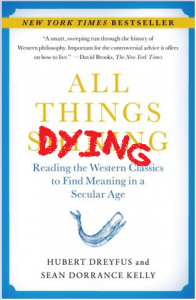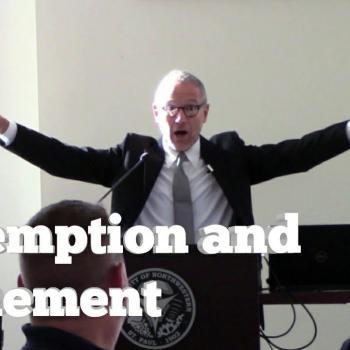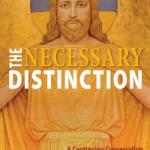Note: I am republishing this [slightly revised] book review I did in 2013 of Dreyfus and Kelly’s All Things Shining (2011). I was interested to see the book mentioned often (not favorably) in James K.A. Smith’s book How (Not) to be Secular: Reading Charles Taylor (2014), which deals in particular with Taylor’s magnum opus A Secular Age.
Re: the title, the answer is this: because only the risen Christ is Lord of all and the giver of all good gifts. That’s it.
But the wise men of our age do not want this Christ – this beautiful Christ. They do not rejoice and lift their voices to heaven, joyful that the God who is there has the face of the crucified and risen one – and Him alone. They want something inferior, false, and, quite frankly, despicable.
It is from the elite of the elites, in All Things Shining (2011 ; see here and here for two very good Amazon reviews, the first one being the kind of reaction I suspect the authors wanted, and the second one appreciated by me), that we find one of the latest optimistic appraisals of the West’s future – discovering that a polytheism* akin to Homer’s is our hope.
Philosophers Hubert Dreyfus and Sean Dorrance Kelly, of UC-Berkeley and Harvard respectively, write:
“[the gods are] malicious and vindictive and joyous and divine – and the universe is all of these by turns. Which is to say that ultimately it is no one of them. A whole pantheon of gods is really there” (p. 185)
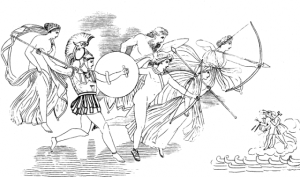
Feel encouraged? In Nietzsche-esque fashion they write:
“At the center of Homer’s world, then, is the sense that what matters is already given to us, and that the best life is the one that manages to get in sync with it. This vision speaks eloquently to our own modern needs. Homer’s Olympian gods give his Greeks a sense of the sacred that underwrites the joys and sorrows of a truly meaningful existence. To lure back these Homeric gods is a saving possibility after the death of God: it would allow us to survive the breakdown of monotheism while resisting the descent into a nihilisitic existence” (p. 61).
Really. Polytheism? (again see * below) They say this is needed, in part, because of the current disenchantment of the world:
“After Descartes, we have come to see ourselves as almost infinitely free assigners of meaning who can give whatever meaning we choose to the meaningless objects around us.” (p. 139)
They also don’t really get Luther, another link in their argumentative chain:
“in Luther’s account of Christianity the world in its political, religious, and environmental forms is entirely disenchanted” (p. 136).
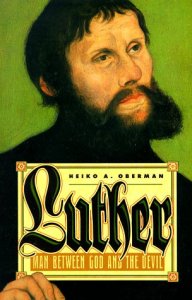 Actually, Luther was a man between God and the devil first and foremost because he believed the world’s institutions – family, church and state – were between God and the devil. In any case, they are out to re-enchant the world with polytheism, and they talk about how in Homer’s Greece people were caught up in the good work of the gods (they don’t focus on the very bad works, really – or the groaning realities of the fallen creation for that matter) and recognize these gifts with thankful hearts. Dreyfus and Kelly talk about how modern man needs to make the effort to make himself open to receive these gifts in thankfulness. This is the right posture, they say.
Actually, Luther was a man between God and the devil first and foremost because he believed the world’s institutions – family, church and state – were between God and the devil. In any case, they are out to re-enchant the world with polytheism, and they talk about how in Homer’s Greece people were caught up in the good work of the gods (they don’t focus on the very bad works, really – or the groaning realities of the fallen creation for that matter) and recognize these gifts with thankful hearts. Dreyfus and Kelly talk about how modern man needs to make the effort to make himself open to receive these gifts in thankfulness. This is the right posture, they say.
And here, in contrast to the freedom – and paralyzing burden – of the choices that those in the modern West must constantly make – they put forth a “grace” from the outside as that which can be the most formative thing in our lives (of course the fact that many a modern man needs to be reminded that something above and outside of himself provides joy, wonder, gratitude and meaning simply shows how far gone the West as a whole is). That said, what is missing here is that the authors basically presuppose that we can – by an act of our will – make ourselves ready and open to receive that Ultimate which is good, true, beautiful, and finally saving.
We cannot.
So, some might ask: are we not responsible at all then? Can we just say “the devil made me do it”?
Well, if you are using this as an excuse, you will pay for it. You are like Helen and you are responsible for what happened with Paris** – even if you think “it just happened” as a gift from the gods. No, you will indeed pay for being ridden by the devil you love.
Repent. Be found in Christ who bled and died to release you from your sin, from death, and from the dark spiritual forces that haunt this fallen world. Be swept away and “attuned” by His purposes and desires instead. For before Him both the “customer is always right” and the “spirit of the age” find their deserved end. And there is no need to “lure [him] back” – for He is still with us, wherever His word is proclaimed – even in the moment you read this – and His sacraments administered according to His command.
Again, “All things Shining” advocates a return to polytheism. Not necessarily Homer’s pantheon, but something like it. Practically speaking, this means gods that are more like fallen human beings. You know, the petty and vindictive who strike you down when you offend them and their honor. Those who love war and encourage adultery and use their charisma to make it happen. Those who don’t really care about some people and look very bad compared to Jesus.
There is a good reason why very early Christian apologists like Justin Martyr and Athenagoras mercilessly skewered and mocked the gods of the ancient world (see here and here, for example). While in the Old Testament it is human beings and particularly God’s very own people who don’t come off so well, in Greek mythology it is the divine beings themselves who don’t. We need to be saved from this, not by this.

Don’t get me wrong here – David Brooks is right to say that this is a “smart” book. It is very smart: these men are indeed learned, insightful, and creative and I did learn some valuable things from them. Their diagnosis and analysis of the modern malaise that infects our elites – and increasingly our populace – has much to say to us. That said, it is amazing that the more things change, the more they stay the same. Goodbye West? Hello India?
But hear o worldly wise, the truth does not change:
“He has fixed a day in which He will judge the world in righteousness through a Man whom He has appointed, having furnished proof to all men by raising Him from the dead.” (Acts 17:31, NASB)
And I mean to start a conversation with unbelievers by saying this, not cut off discussion by being “unreasonable” or “irrational”. For those who end up disagreeing with me, you only have my continued prayers and desire for friendship, whether in this life or the next life or both.
Heed, friend:
The world is passing away along with its desires, but whoever does the will of God abides forever.—I John 2:17
FIN
Notes:
*While “polytheism” may indeed simply be a figure of speech the authors use to make a deeper point about “polytheistic moods”, it seems to me that there is nothing in their book a real polytheist need object to. I fail to see the reason the book cannot serve as a ‘soft’ introduction to real polytheism, as unlikely as that might seem right now. From an Amazon reviewer: “The call to a renewed polytheism is not so much a plea to reconsider the tedious and metaphysical arguments about the existence of gods or God. These arguments prove everything and nothing at once. It is rather an invitation to heed impulses alive, but rarely acknowledged, within us all. It is a call to rediscover, without shame this time, a sense of the sacred. The gods appear in this work as mere tropes, figures of speech that give us a shared vocabulary, a means of joining hands across the unbridgeable silence separating us from one another. It is a call to being open to what is present: ‘[O]ur focus on ourselves as isolated, autonomous agents has had the effect of banishing the gods – that is to say, covering up or blocking our sensitivity to what is sacred in the world. The gods are calling us but we have ceased to listen.’ Amen, I want incongruously to say.”
**From another Amazon reviewer: “Helen of Troy, despite causing the Trojan War and leaving her husband to run of with Paris, was acting with ‘arete’, with excellence, by being responsive to Aphrodite’s call. Later, the wave passed and the mood subsided and she returned to her husband, and was responsive to Hera’s call, to the domestic dimension in life, without feeling the need to rank, reconcile, or compare the two dimensions or moralize her actions. THIS is what POLYTHEISM truly means. It means that there is no overarching mono-logic consideration that can rank and adjudicate the gods and goddess and the realities, the domains, over which they preside. To decline from this to monotheism is to narrow the range and wonder of human life from its multi-dimensional richness in Homer, to the nothingness of a line, a single dimension, in the modern world.”
Sounds like a view tailor-made for the increasingly decadent West. A view that will allow for both greater non-Christian spirituality and greater immorality.
My pastor adds:
“what Dreyfus and Kelly assert makes complete sense: The idea of gods and goddesses comes into being to explain the unexplainable to man. I thought the same of the movie Slumdog Millionaire: It relieved the angst of the actors and actresses in Hollywood by convincing them that they need not feel guilty about their popularity and wealth, it was just a matter of chance; if it was not them, it would have been someone else.”
Ah, yes, the kind of “chance” that even a non-Darwinist pagan can get behind….

